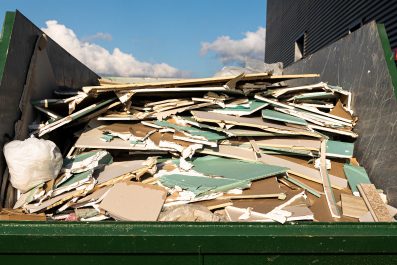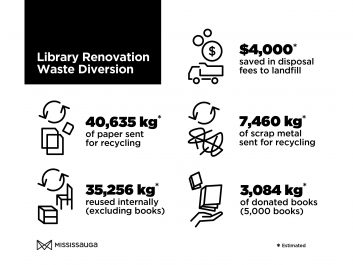Library Renovation Waste Diversion Project Sets New and Innovative Standard for Mississauga
Environment | April 1, 2022
Construction, renovation and demolition waste continue to be the largest contributors of waste in municipal and regional landfills in Ontario. Materials like wood, bricks, drywall, metal, cardboard, carpeting as well as furnishings can be reused or recycled.
Municipalities like Mississauga are prioritizing programs and strategies that divert waste from landfills. They also look for more ways to effectively reuse and recycle and manage used products and materials. Not only does reusing and recycling divert material from landfills but it also helps reduce carbon dioxide emissions. Manufacturing new building supplies and furnishings contributes to the generation of carbon dioxide – one of the greenhouse gases that contribute to global warming – so when materials are reused or recycled emissions are avoided.
Diverting City waste supports the City’s Strategic Plan to:
- lead and encourage environmentally responsible actions
- conserve, enhance and connect natural environments
- promote a green culture
Since 2021, Mississauga has diverted more than 75 per cent of its demolition construction waste from landfills.
Recently, the City underwent a major waste diversion project at the Hazel McCallion Central Library that resulted in substantial environmental, community and economic benefits. Using the Disposal of Surplus City Assets Policy as a guide, staff from across City divisions (e.g. library, environment, space planning, procurement and IT) developed and implemented a plan to reduce the number of City-owned items that would be sent to landfill prior to construction. City staff were able to reuse, recycle and donate a number of items to reduce environmental impacts.
Leveraging our membership in Partners in Project Green’s material exchange program, the City was able to donate items like chairs, bookshelves, display cases, book carts, filing cabinets, lockers, desks and office chairs to Habitat for Humanity, Salvation Army and other not-for-profit organizations.
It’s estimated that more than 120,000 kg of City-owned items were diverted from landfill, including:
The project saved the City an estimated $75,000 in third party expenses. Also, by internally reusing and donating assets, this project saved the City an estimated $4,000 in disposal fees to landfill. This resulted in 40 kgs of CO2 emissions avoided from landfill and additional emissions that would have otherwise been created to manufacturer new material. It also addresses specific actions within our climate plan.
The City has developed a fully documented best practice model for future removal of City-owned items before renovation and construction projects begin. It incorporates a commitment to reduce, reuse and recycle into all City operations.
The construction project is also following the City’s Corporate Green Building Standards, which include the need to reduce the amount of construction and demolition waste that is sent to landfills or incinerated by promoting good waste management practices. Since the demolition began in April 2021, the majority of wood, concrete and scrap metal have been sent for recycling with an estimated 650,000 kg diverted from landfill so far with more to be diverted as the renovations continue. Along with diverted materials, the construction project will also include environmentally sustainable initiatives in the newly renovated building such as bird-friendly glass and lighting control measures to reduce light pollution.
A circular economy ensures that all products, materials and resources are reused or recycled. The City is committed to advancing waste diversion initiatives and exploring the circular economy further. This year, Mississauga became a Founding Member of the Circular Economy Leaders Consortium, in partnership with TELUS and Partners in Project Green joining other companies and organizations committed to moving the circular economy forward. A consortium is an exclusive group of sustainability professionals working collaboratively to reduce waste and move towards a circular economy.
As the City moves to advance the circular economy and become a waste diversion leader, it will continue to tackle climate risks and build resilient communities with sustainable practices and zero-waste solutions.
Learn more about how Mississauga is leading climate change efforts and other environmental sustainability initiatives through the Climate Change Action Plan and Living Green Master Plan.
Tags
Media Contact:
City of Mississauga Media Relations
media@mississauga.ca
905-615-3200, ext. 5232
TTY: 905-896-5151






